5 books about Corbett, John
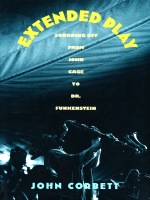
Extended Play
Sounding Off from John Cage to Dr. Funkenstein
John Corbett
Duke University Press, 1994
In Extended Play, one of the country's most innovative music writers conducts a wide-ranging tour through the outer limits of contemporary music. Over the course of more than twenty-five portraits, interviews, and essays, John Corbett engages artists from lands as distant as Sweden, Siberia, and Saturn. With a special emphasis on African American and European improvisers, the book explores the famous and the little known, from John Cage and George Clinton to Anthony Braxton and Sun Ra. Employing approaches as diverse as the music he celebrates, Corbett illuminates the sound and theory of funk and rap, blues and jazz, contemporary classical, free improvisation, rock, and reggae.
Using cultural critique and textual theory, Corbett addresses a broad spectrum of issues, such as the status of recorded music in postmodern culture, the politics of self-censorship, experimentation, and alternativism in the music industry, and the use of metaphors of space and madness in the work of African American musicians. He follows these more theoretically oriented essays with a series of extensive profiles and in-depth interviews that offer contrasting and complementary perspectives on some of the world’s most creative musicians and their work. Included here are more than twenty original photographs as well as a meticulously annotated discography. The result is one of the most thoughtful, and most entertaining, investigations of contemporary music available today.
Using cultural critique and textual theory, Corbett addresses a broad spectrum of issues, such as the status of recorded music in postmodern culture, the politics of self-censorship, experimentation, and alternativism in the music industry, and the use of metaphors of space and madness in the work of African American musicians. He follows these more theoretically oriented essays with a series of extensive profiles and in-depth interviews that offer contrasting and complementary perspectives on some of the world’s most creative musicians and their work. Included here are more than twenty original photographs as well as a meticulously annotated discography. The result is one of the most thoughtful, and most entertaining, investigations of contemporary music available today.
[more]
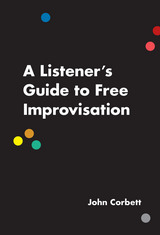
A Listener's Guide to Free Improvisation
John Corbett
University of Chicago Press, 2016
Improvisation rattles some listeners. Maybe they’re even suspicious of it. John Coltrane’s saxophonic flights of fancy, Jimi Hendrix’s feedback drenched guitar solos, Ravi Shankar’s sitar extrapolations—all these sounds seem like so much noodling or jamming, indulgent self-expression. “Just” improvising, as is sometimes said. For these music fans, it seems natural that music is meant to be composed. In the first book of its kind, John Corbett’s A Listener’s Guide to Free Improvisation provides a how-to manual for the most extreme example of spontaneous improvising: music with no pre-planned material at all. Drawing on over three decades of writing about, presenting, playing, teaching, and studying freely improvised music, Corbett offers an enriching set of tools that show any curious listener how to really listen, and he encourages them to enjoy the human impulse— found all around the world— to make up music on the spot.
Corbett equips his reader for a journey into a difficult musical landscape, where there is no steady beat, no pre-ordained format, no overarching melodic or harmonic framework, and where tones can ring with the sharpest of burrs. In “Fundamentals,” he explores key areas of interest, such as how the musicians interact, the malleability of time, overcoming impatience, and watching out for changes and transitions; he grounds these observations in concrete listening exercises, a veritable training regime for musical attentiveness. Then he takes readers deeper in “Advanced Techniques,” plumbing the philosophical conundrums at the heart of free improvisation, including topics such as the influence of the audience and the counterintuitive challenge of listening while asleep. Scattered throughout are helpful and accessible lists of essential resources—recordings, books, videos— and a registry of major practicing free improvisors from Noël Akchoté to John Zorn, particularly essential because this music is best experienced live.
The result is a concise, humorous, and inspiring guide, a unique book that will help transform one of the world’s most notoriously unapproachable artforms into a rewarding and enjoyable experience.
Corbett equips his reader for a journey into a difficult musical landscape, where there is no steady beat, no pre-ordained format, no overarching melodic or harmonic framework, and where tones can ring with the sharpest of burrs. In “Fundamentals,” he explores key areas of interest, such as how the musicians interact, the malleability of time, overcoming impatience, and watching out for changes and transitions; he grounds these observations in concrete listening exercises, a veritable training regime for musical attentiveness. Then he takes readers deeper in “Advanced Techniques,” plumbing the philosophical conundrums at the heart of free improvisation, including topics such as the influence of the audience and the counterintuitive challenge of listening while asleep. Scattered throughout are helpful and accessible lists of essential resources—recordings, books, videos— and a registry of major practicing free improvisors from Noël Akchoté to John Zorn, particularly essential because this music is best experienced live.
The result is a concise, humorous, and inspiring guide, a unique book that will help transform one of the world’s most notoriously unapproachable artforms into a rewarding and enjoyable experience.
[more]
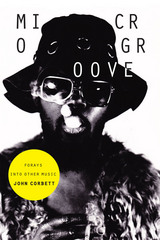
Microgroove
Forays into Other Music
John Corbett
Duke University Press, 2015
Microgroove continues John Corbett's exploration of diverse musics, with essays, interviews, and musician profiles that focus on jazz, improvised music, contemporary classical, rock, folk, blues, post-punk, and cartoon music. Corbett's approach to writing is as polymorphous as the music, ranging from oral history and journalistic portraiture to deeply engaged cultural critique. Corbett advocates for the relevance of "little" music, which despite its smaller audience is of enormous cultural significance. He writes on musicians as varied as Sun Ra, PJ Harvey, Koko Taylor, Steve Lacy, and Helmut Lachenmann. Among other topics, he discusses recording formats; the relationship between music and visual art, dance, and poetry; and, with Terri Kapsalis, the role of female orgasm sounds in contemporary popular music. Above all, Corbett privileges the importance of improvisation; he insists on the need to pay close attention to “other” music and celebrates its ability to open up pathways to new ideas, fresh modes of expression, and unforeseen ways of knowing.
[more]
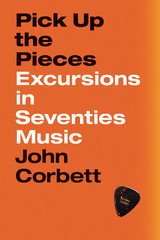
Pick Up the Pieces
Excursions in Seventies Music
John Corbett
University of Chicago Press, 2019
Unless you lived through the 1970s, it seems impossible to understand it at all. Drug delirium, groovy fashion, religious cults, mega corporations, glitzy glam, hard rock, global unrest—from our 2018 perspective, the seventies are often remembered as a bizarre blur of bohemianism and disco. With Pick Up the Pieces, John Corbett transports us back in time to this thrillingly tumultuous era through a playful exploration of its music. Song by song, album by album, he draws our imaginations back into one of the wildest decades in history.
Rock. Disco. Pop. Soul. Jazz. Folk. Funk. The music scene of the 1970s was as varied as it was exhilarating, but the decade’s diversity of sound has never been captured in one book before now. Pick Up the Pieces gives a panoramic view of the era’s music and culture through seventy-eight essays that allow readers to dip in and out of the decade at random or immerse themselves completely in Corbett’s chronological journey.
An inviting mix of skilled music criticism and cultural observation, Pick Up the Pieces is also a coming-of-age story, tracking the author’s absorption in music as he grows from age seven to seventeen. Along with entertaining personal observations and stories, Corbett includes little-known insights into musicians from Pink Floyd, Joni Mitchell, James Brown, and Fleetwood Mac to the Residents, Devo, Gal Costa, and Julius Hemphill.
A master DJ on the page, Corbett takes us through the curated playlist that is Pick Up the Pieces with captivating melody of language and powerful enthusiasm for the era. This funny, energetic book will have readers longing nostalgically for a decade long past.
Rock. Disco. Pop. Soul. Jazz. Folk. Funk. The music scene of the 1970s was as varied as it was exhilarating, but the decade’s diversity of sound has never been captured in one book before now. Pick Up the Pieces gives a panoramic view of the era’s music and culture through seventy-eight essays that allow readers to dip in and out of the decade at random or immerse themselves completely in Corbett’s chronological journey.
An inviting mix of skilled music criticism and cultural observation, Pick Up the Pieces is also a coming-of-age story, tracking the author’s absorption in music as he grows from age seven to seventeen. Along with entertaining personal observations and stories, Corbett includes little-known insights into musicians from Pink Floyd, Joni Mitchell, James Brown, and Fleetwood Mac to the Residents, Devo, Gal Costa, and Julius Hemphill.
A master DJ on the page, Corbett takes us through the curated playlist that is Pick Up the Pieces with captivating melody of language and powerful enthusiasm for the era. This funny, energetic book will have readers longing nostalgically for a decade long past.
[more]
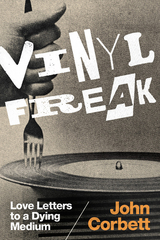
Vinyl Freak
Love Letters to a Dying Medium
John Corbett
Duke University Press, 2017
From scouring flea markets and eBay to maxing out their credit cards, record collectors will do just about anything to score a long-sought-after album. In Vinyl Freak, music writer, curator, and collector John Corbett burrows deep inside the record fiend’s mind, documenting and reflecting on his decades-long love affair with vinyl. Discussing more than 200 rare and out-of-print LPs, Vinyl Freak is composed in part of Corbett's long-running DownBeat magazine column of the same name, which was devoted to records that had not appeared on CD. In other essays where he combines memoir and criticism, Corbett considers the current vinyl boom, explains why vinyl is his preferred medium, profiles collector subcultures, and recounts his adventures assembling the Alton Abraham Sun Ra Archive, an event so all-consuming that he claims it cured his record-collecting addiction. Perfect for vinyl newbies and veteran crate diggers alike, Vinyl Freak plumbs the motivations that drive Corbett and collectors everywhere.
[more]
READERS
Browse our collection.
PUBLISHERS
See BiblioVault's publisher services.
STUDENT SERVICES
Files for college accessibility offices.
UChicago Accessibility Resources
home | accessibility | search | about | contact us
BiblioVault ® 2001 - 2024
The University of Chicago Press









